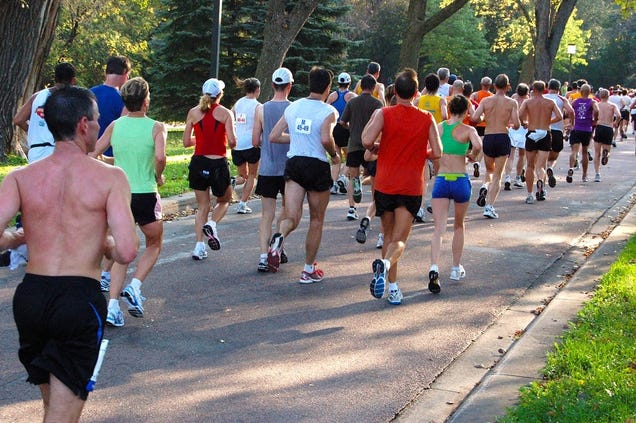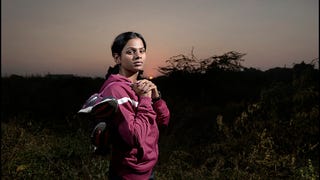In June of 2013, Fadumo ran a half-marathon. Despite warm temperatures, she ran in a head scarf, long-sleeve shirt, pants and a knee-length skirt over the pants. Fadumo is Somali, and like 99 percent of Somalis, she is Muslim. She effused about how fit and healthy she felt, how proud for making it the whole 13.1 miles, and how the feat made her feel like a true citizen of Minneapolis, rather than just a member of the Somali community there, the largest in the U.S.  “This sounds racist, but I thought running marathons was for white people,” she laughed. “Fit, healthy white people. At first, I thought, you’re not one of them; you can’t run. Now I am a runner. I feel amazing about myself.”
“This sounds racist, but I thought running marathons was for white people,” she laughed. “Fit, healthy white people. At first, I thought, you’re not one of them; you can’t run. Now I am a runner. I feel amazing about myself.”
Running the half-marathon was didactic, as much a personal goal as it was to show other Somali women they could be active within the parameters of Islam. To this end, Fadumo was extra careful about where and when she trained, and what she wore while running, but it wasn’t enough.
“People, on Facebook, say running is not very Islamic,” she said. “They say it’s not Islamic for women to be running or to be talking about working out. They haven’t seen that growing up, and don’t know how to keep their religion and do sports. I wanted to show [other Somali women] if they cannot wear pants alone, they can wear a skirt too. But even with skirt and pants, people still had objections. I know I did my best to show it’s possible to stay appropriate for my culture and still run.”
Running as a sport never quite took off in Somalia, partly because the country was mired in chaos in the 1990s when distance running became a viable career option in neighboring Kenya and Ethiopia. But since the diaspora, a number of Somali men have reached the very pinnacle of the sport—Mo Farah, Abdi Abdirahman, and the Twin Cities’ own up-and-comers, Hassan Mead and Harun Abda.
In patriarchal Kenya and Ethiopia, women’s running lagged behind men’s by about ten years. East African women are now as dominant in the sport as men, with income and global recognition to match, and that’s had major societal impact—those countries are still male-dominated, but the dial has edged toward equality in an amazingly brief period of time. Kenyan and Ethiopian women had to overcome many barriers to get to the start line, but religion was generally not one of them.
Culture is one thing; religion is something else entirely. Heck, it was not the cultural norm inour country for women to jog around the streets in shorts and a t-shirt until the 1970s. Let’s recall that Katherine Switzer was nearly bounced from the Boston Marathon in 1967, and the first women’s Olympic marathon only took place in 1984.
But running has never specifically been considered un-Christian or un-Jewish or un-Buddhist. It’s never been seen as an affront to God. Pioneers of women’s running had to deal with frowning neighbors and scoffing passersby, but they never had to think about whether they would burn in hell for trotting around in public, about whether or not they were insulting The Prophet or God, or labeling themselves immodest, sacrilegious women by running. It wasn’t who she trained with (other women), or whether she trained in sight of men (mostly not), or what she wore (fully covered) while running, but rather the very act of running by a woman that anonymous critics called un-Islamic. That’s strong stuff; that’s a pretty big barrier.
 Is running un-Islamic? Fadumo has to live in the tight Somali community in the Twin Cities where a little social pressure goes a long way. She wasn’t able convince many other Somali women to run, and doesn’t have plans for more races herself, but she’s still an ardent advocate for women’s participation in sports. While she was willing to test the boundaries of her religion, she admits most Somali women stay well within the safe zone, and in fact, use religious strictures as an excuse not to be active at all.
Is running un-Islamic? Fadumo has to live in the tight Somali community in the Twin Cities where a little social pressure goes a long way. She wasn’t able convince many other Somali women to run, and doesn’t have plans for more races herself, but she’s still an ardent advocate for women’s participation in sports. While she was willing to test the boundaries of her religion, she admits most Somali women stay well within the safe zone, and in fact, use religious strictures as an excuse not to be active at all.
“If it comes down to not working out at all, I tell women to work out at home,” Fadumo said, though she admits that pretty much precludes running, and doesn’t provide the sense of community she felt during her half-marathon. “I was exhausting all the options, showing all the ways they [Somali women] can make this happen. I say, get creative, work out to a video in your basement. No one can say no.”
Though Somalis have settled in Minnesota since the early 1990s, and by now many are second-generation Americans, Fadumo doesn’t see attitudes toward women’s running changing any time soon. “I’d be surprised,” she said. “It’s not normal yet. That’s my thing—let’s break the cycle, let’s tell them, Hey, it’s ok. It’s a good thing—why don’t you be part of a positive thing?”
By Sarah Barker
![]()






























